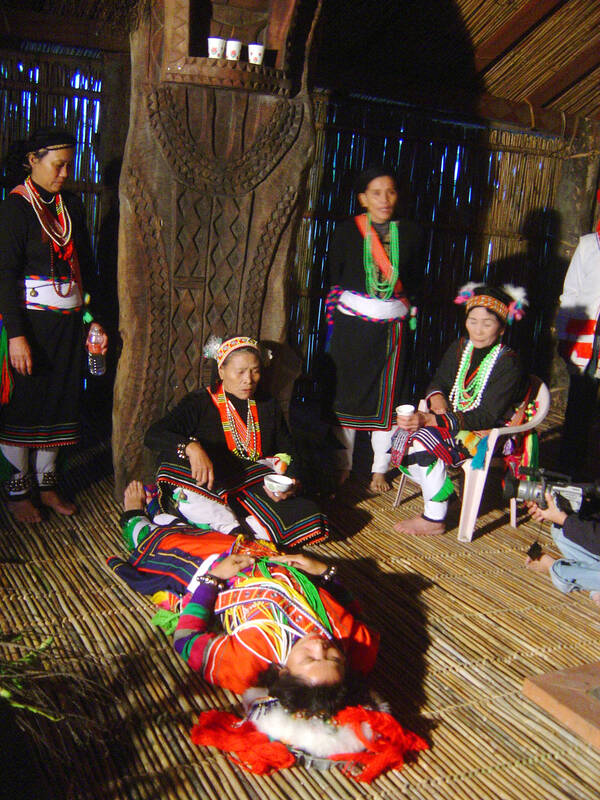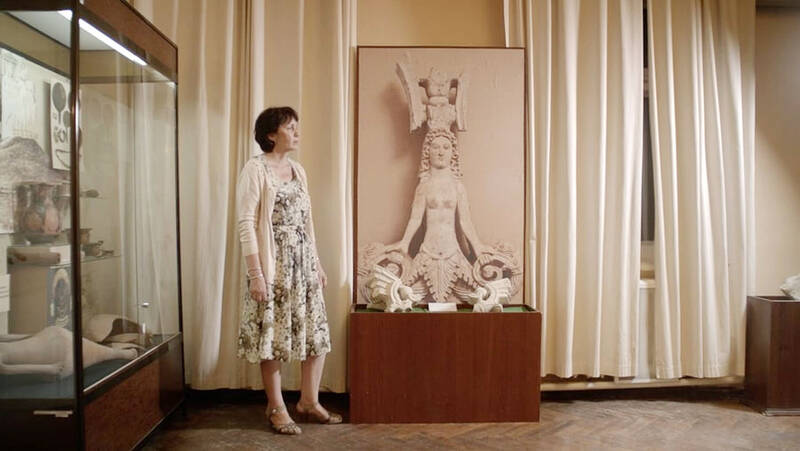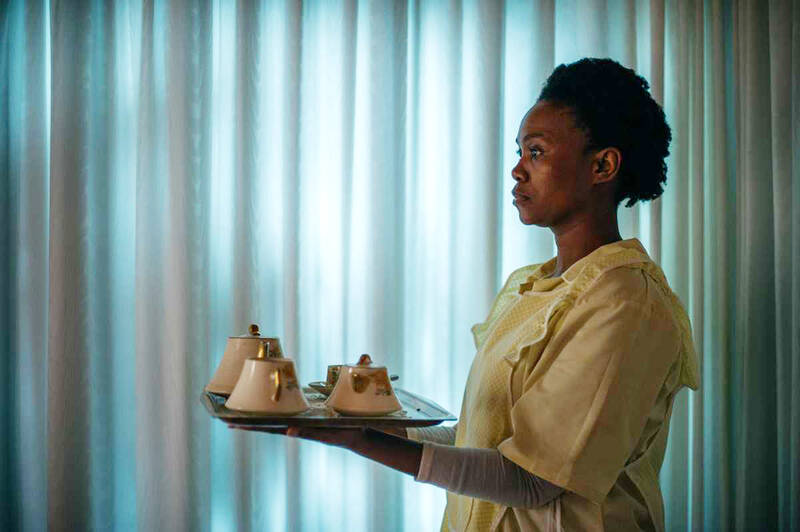Kuo Min-jung (郭敏容) was stumped when she learned of this year’s theme for the International Human Rights Film Festival (國際人權影展): “Power of Museums.” The previous topics were straightforward enough — climate change, transnational migration, medical rights and so on, but what did museums have to do with human rights?
“The room fell silent, and we looked at each other blankly,” Kuo recalls. “We considered giving up and going with something else, but suddenly we felt this determination to accept the challenge … especially since the festival is sponsored by [the National Human Rights Museum].”
After much digging, Kuo and the three other curators came up with five feature films and one animated short for the “Whose Museum is it?” section of the festival, which runs from today through Sunday at Spot Huashan Cinema in Taipei. The annual “Human Rights Lens” section explores issues that are pertinent today and also continues with some of the previous year’s topics.

Photo courtesy of International Human Rights Film Festival
For the first time since the festival’s inception in 2017, there will be a feature film — and a horror flick, no less. Set in post-apartheid South Africa, Good Madam is an eerie, psychological tale that delves into issues of race and class.
For those who can’t make it this weekend, the festival will go on-line from Sept. 26 to Oct. 10 on documentary streaming platform Giloo. There will also be collaborative screenings at different locales afterward.
FINDING THE RIGHT FILMS

Photo courtesy of International Human Rights Film Festival
Kuo says curators should always prioritize the quality of the films and let them speak for the topic, instead of letting the theme drive the selection.
But this time, the team started by getting their hands on any museum-related film they could find, and they first noticed that museums are a popular backdrop for commercial action, spy and romance flicks. There were also quite a few films that explored the history of certain museums, how they started, where their objects came from and other important and interesting events.
They then found films featuring museums that explored relevant issues such as climate change, but it still wasn’t exactly what they wanted. Finally, they came across the Dutch production, The Treasures of Crimea. In 2014, a museum in the Netherlands borrowed a collection of Crimean artifacts for a special exhibit. Just months later, Russia annexed Crimea from Ukraine, leading to an international legal battle on whether the museum should return the artifacts to Crimea or to Ukraine.

Photo courtesy of Visit Films
“It features a museum, it’s connected to current events, the plot is exciting, the director is well-known and it’s relatively new,” Kuo says.
She noted that while international opinion overwhelmingly condemns Russia, especially with the ongoing war, this film avoids taking sides, instead exploring the conflict through identity and cultural relations with the artifacts.
“For a Crimean person, perhaps they voted to join Russia, but that doesn’t cut off their emotional connection to their cultural treasures,” Kuo says. “We had finally found a possible direction, and began discovering other films that followed this theme.”
The Colonial Institute is a layered examination on scientific research and artifact collection during Germany’s brutal colonization of Africa, with the German narrator constantly questioning and musing on the issue.
“You might have to watch it a few times,” Kuo says. “It makes us think about how many museums have more or less of a dark, violent history.”
Restitution: Africa’s Fight For Its Art is an info-packed primer on the same issue and explores the politics, language sensitivities and other concerns behind Western museums returning artifacts to their original owners.
On the contrary, in anthropologist Hu Tai-li’s (胡台麗) Returning Soul (讓靈魂回家), the Amis people of Tafalong don’t necessary want their historic column back from Academia Sinica — it’s more important to be able to guide its soul back to the village.
Finally, Girls Museum and Muteum challenge established structures in modern museums. By doing so, the films seek to bring in more diverse perspectives, whether gender, race or class.
“If you finish the entire section, you can probably get accepted to a museum studies graduate program,” quips co-curator Chen Chun-jung (陳俊蓉).
Chen says that the “Human Rights Lens” section is comparatively less academic, and the selections mainly discuss climate change, transitional justice and state violence.

June 9 to June 15 A photo of two men riding trendy high-wheel Penny-Farthing bicycles past a Qing Dynasty gate aptly captures the essence of Taipei in 1897 — a newly colonized city on the cusp of great change. The Japanese began making significant modifications to the cityscape in 1899, tearing down Qing-era structures, widening boulevards and installing Western-style infrastructure and buildings. The photographer, Minosuke Imamura, only spent a year in Taiwan as a cartographer for the governor-general’s office, but he left behind a treasure trove of 130 images showing life at the onset of Japanese rule, spanning July 1897 to

One of the most important gripes that Taiwanese have about the Democratic Progressive Party (DPP) is that it has failed to deliver concretely on higher wages, housing prices and other bread-and-butter issues. The parallel complaint is that the DPP cares only about glamor issues, such as removing markers of Chinese Nationalist Party (KMT) colonialism by renaming them, or what the KMT codes as “de-Sinification.” Once again, as a critical election looms, the DPP is presenting evidence for that charge. The KMT was quick to jump on the recent proposal of the Ministry of the Interior (MOI) to rename roads that symbolize

On the evening of June 1, Control Yuan Secretary-General Lee Chun-yi (李俊俋) apologized and resigned in disgrace. His crime was instructing his driver to use a Control Yuan vehicle to transport his dog to a pet grooming salon. The Control Yuan is the government branch that investigates, audits and impeaches government officials for, among other things, misuse of government funds, so his misuse of a government vehicle was highly inappropriate. If this story were told to anyone living in the golden era of swaggering gangsters, flashy nouveau riche businessmen, and corrupt “black gold” politics of the 1980s and 1990s, they would have laughed.

In an interview posted online by United Daily News (UDN) on May 26, current Chinese Nationalist Party (KMT) Chairman Eric Chu (朱立倫) was asked about Taichung Mayor Lu Shiow-yen (盧秀燕) replacing him as party chair. Though not yet officially running, by the customs of Taiwan politics, Lu has been signalling she is both running for party chair and to be the party’s 2028 presidential candidate. She told an international media outlet that she was considering a run. She also gave a speech in Keelung on national priorities and foreign affairs. For details, see the May 23 edition of this column,